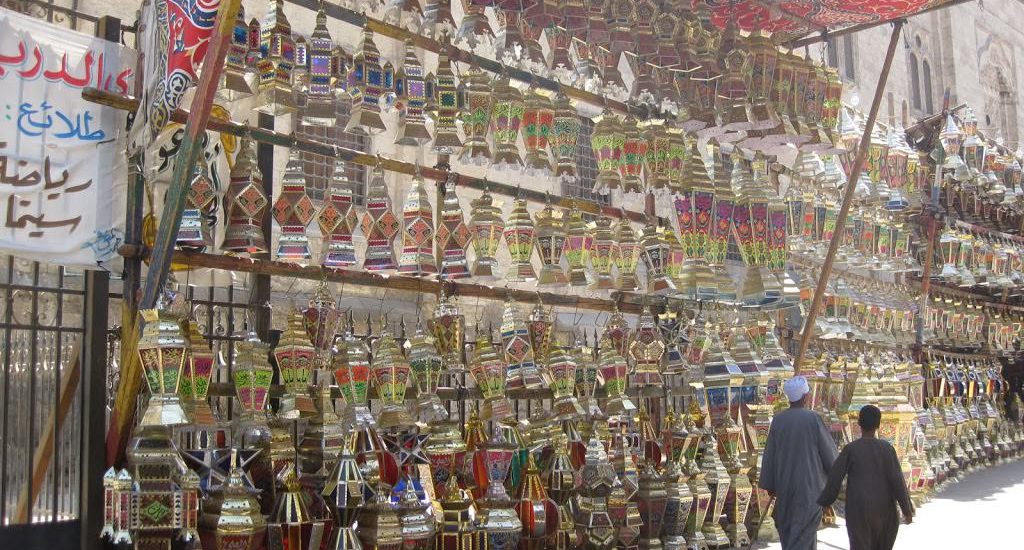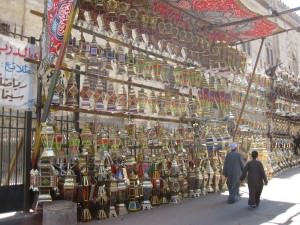Franciscan Friday’s on Ramadan: Preparing for the Light

To celebrate interfaith friendship and St. Francis’ history with Islam, Fr. Michael Calabria, OFM is guest blogging about Ramadan every Friday though August 17.
 |
| A shop in Cairo displaying Ramadan lanterns for sale. |
Dates – the sugary sweet fruit of the palm tree. They are the first food traditionally eaten after a day of fasting during Ramadan (along with a cup of water), like one’s first bit of nourishment after crossing the desert. They have been a staple of people in the Middle East for millennia.
They are a biblical food; they are a Qur’anic food. According to the chapter (sura) of the Qur’an titled Maryam (the Arabic form of Mary), when it came time for Mary to give birth to Jesus, “the pains of childbirth drove her to the trunk of a palm tree” where God provided her with dates and water” (19.11-25). The dates and water with which God sustained Mary also revive those who are fasting.
Ramadan is about hungering and thirsting, not simply for food and drink but for a closer relationship with God, for faith and forgiveness, for justice and peace, for a world in which God’s bounty is available to all. It’s also about bringing to birth something new in our lives, something that speaks of God, His prophets and His Word, something that illumines the darkness of our hearts and the world.
Ramadan is therefore perhaps more analogous to Advent than it is to Lent. During Advent, Christians prepare themselves to again receive the Word, the light of Christ that came into the world. During Ramadan, Muslims prepare themselves anew to receive God’s Word that was revealed in the Qur’an. For Christians, God’s Word is symbolized by the candles of the Advent wreath; for Muslims it is the fanoos – the colorful candle-lit lantern that people hang outside their homes and businesses during Ramadan.
My first experience of Ramadan was in 2001. I was spending my pastoral year (the year before taking solemn vows) in Egypt, serving at a leprosy clinic outside of Cairo. Most of my co-workers and the people to whom I ministered were Muslim. One of the male nurses, Mohsen, invited me to stay overnight at the clinic to break the fast and celebrate with him and the local community.
We waited for the sunset call to prayer (maghrib) to signal the end of the fast. It blared into the room not from a minaret but from the TV. Then we ate dates – just two or three, but slowly my body, fatigued from the workday and weakened from fasting, came back to life, and my mind awoke from its torpor. God had provided us with sustenance from the palm tree just as he had Mary.
We spent the rest of the evening and much of the night in the village going from home to home feasting and celebrating. It felt like Christmas to me, and with good reason: that year Ramadan and Advent coincided for several weeks in December. Ramadan lanterns and Advent wreaths together lit up the dark winter nights.
The world today still needs that light, the light that both Muslims and Christians can bear to the world through their respective faiths and traditions, witnessing to the one God who sustains us all.
Fr. Michael Calabria, OFM is a Franciscan friar of Holy Name Province. For the past nine years he has taught Arabic and Islamic Studies at St. Bonaventure University, and is currently pursuing his doctorate in Arab and Islamic Studies with the University of Exeter, UK, and serving as a chaplain-in-residence at Georgetown University. Fr. Michael has lived, ministered and taught in Egypt, has traveled extensively in the Middle East, and speaks widely on Islam, Middle Eastern Affairs, and Christian-Muslim Relations.
Tagged in:

